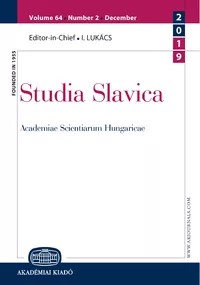Концептуализация судьбы в творчестве Ф. М. Достоевского
The Conceptualization of Fate in Dostoevsky’s Works
Author(s): Yulia Vladimirovna Pogrebniak, ALAN SOLTANOVICH TSKHOVREBOV, Tamara Ibragimovna Magomedova, Mikhail Sergeevich KhmelevskiySubject(s): Russian Literature
Published by: Akadémiai Kiadó
Keywords: F. Dostoevsky; the novel Idiot; the novel The Brothers Karamazov; the concept of fate; the conceptual side of the concept; the figurative side of the concept; the value component of the concept
Summary/Abstract: Undoubtedly, Dostoevsky’s works have a great influence on the worldview and in particular the linguistic image of the world of modern Russian people, so it is interesting to consider basic concepts of Russian linguistic culture in Dostoevsky’s writings. The aim of this study is to identify the features of the representation of the concept of fate in the works of this great writer. The subject of the study is the contexts in which the keyword судьба ‘fate’ is used in Dostoevsky’s novels The Idiot and The Brothers Karamazov. In the paper, the authors analyzed 40 examples of the contextual use of this concept in the first and 57 examples in the second work as well as its synonyms доля ‘share’, жребий ‘lot’, удел, участь ‘destiny’, провидение ‘providence’, and рок, фатум ‘doom’. In the paper, the methods of conceptual and contextual analysis are applied. The conceptual component of the concept of fate in Dostoevsky’s works is presented as a sequence of events in a person’s life and after his death in the form of a soul, so it is related to the concept of God. The figurative component of the concept of fate in Dostoevsky’s works is expressed by the idea of fate as a living being that can actively perform any actions in relation to a person, for example, to be favourable to him, or, conversely, cruel. The value component of the concept of fate in Dostoevsky’s works is mainly represented by a description of what a person can do with his own fate and the fate of other people, for example, to share their fate with them or to take part in the fate of others as well as the idea of the justice of fate, associated with the idea of the justice of God’s judgment.
Journal: Studia Slavica Academiae Scientiarum Hungaricae
- Issue Year: 67/2022
- Issue No: 1-2
- Page Range: 187-197
- Page Count: 11
- Language: Russian
- Content File-PDF

